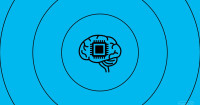The Year That A.I. Came for Culture
newrepublic.com – Thursday December 21, 2023

The events of 2023 showed that A.I. doesn’t need to be that good in order to do damage.
This March, news broke that the latest artificial intelligence models could pass the LSAT, SAT, and AP exams. It sparked another round of A.I. panic. The machines, it seemed, were already at peak human ability. Around that time, I conducted my own, more modest test. I asked a couple of A.I. programs to “write a six-word story about baby shoes,” riffing on the famous (if apocryphal) Hemingway story. They failed but not in the way I expected. Bard gave me five words, and ChatGPT produced eight. I tried again, specifying “exactly six words,” and received eight and then four words. What did it mean that A.I. could best top-tier lawyers yet fail preschool math?
A year since the launch of ChatGPT, I wonder if the answer isn’t just what it seems: A.I. is simultaneously impressive and pretty dumb. Maybe not as dumb as the NFT apes or Zuckerberg’s Metaverse cubicle simulator, which Silicon Valley also promised would revolutionize all aspects of life. But at least half-dumb. One day A.I. passes the bar exam, and the next, lawyers are being fined for citing A.I.-invented laws. One second it’s “the end of writing,” the next it’s recommending recipes for “mosquito-repellant roast potatoes.” At best, A.I. is a mixed bag. (Since “artificial intelligence” is an intentionally vague term, I should specify I’m discussing “generative A.I.” programs like ChatGPT and MidJourney that create text, images, and audio. Credit where credit is due: Branding unthinking, error-prone algorithms as “artificial intelligence” was a brilliant marketing coup.)
To read the full article on newrepublic.com, click here




 Three books, two publishers, one year...
Three books, two publishers, one year... Is 2017 Your Year To Write And Publish A Book?
Is 2017 Your Year To Write And Publish A Book? At the start of this year, I could barely sell my writing. These 10 online classes, books, and podcasts helped me get published in The New York Times and land 2 literary agents.
At the start of this year, I could barely sell my writing. These 10 online classes, books, and podcasts helped me get published in The New York Times and land 2 literary agents. ‘This is the year I’ll write my novel’: new year’s resolutions and the creative mind
‘This is the year I’ll write my novel’: new year’s resolutions and the creative mind Want to Write a Book This Year? These Tools Can Help
Want to Write a Book This Year? These Tools Can Help Writers: Now Is The Time To Set Your Goals For The New Year
Writers: Now Is The Time To Set Your Goals For The New Year University of Utah offers year-long novel-writing course
University of Utah offers year-long novel-writing course Evelyn Conlon: prize culture devalues art of writing
Evelyn Conlon: prize culture devalues art of writing Make this the year you finally write your book
Make this the year you finally write your book They Say It Only Takes One: My Year of Trying to Get an Agent, and Get Pregnant
They Say It Only Takes One: My Year of Trying to Get an Agent, and Get Pregnant How I got my book published - An interview with author, Marion Grace Woolley
How I got my book published - An interview with author, Marion Grace Woolley How I got a publisher - An interview with author, Paul Edwards
How I got a publisher - An interview with author, Paul Edwards How to Become a Short Storyist
How to Become a Short Storyist I tried the AI novel-writing tool everyone hates, and it’s better than I expected
I tried the AI novel-writing tool everyone hates, and it’s better than I expected The Big Five Publishers Have Killed Literary Fiction
The Big Five Publishers Have Killed Literary Fiction 8 Craft Books to Inspire Your New Year’s Writing Resolutions
8 Craft Books to Inspire Your New Year’s Writing Resolutions New Literary Agent Listing: Danielle Marshall
New Literary Agent Listing: Danielle Marshall New Literary Agent Listing: James Gill
New Literary Agent Listing: James Gill Straight white author's career finally takes off after he tells woke publishers he's gender queer Nigerian
Straight white author's career finally takes off after he tells woke publishers he's gender queer Nigerian New Publisher Listing: Crowdbound
New Publisher Listing: Crowdbound New Literary Agent Listing: Lauren Liebow
New Literary Agent Listing: Lauren Liebow The Novelry Offers $100,000 Prize to Break Publishing Barriers
The Novelry Offers $100,000 Prize to Break Publishing Barriers The Sunday Post short story writing competition is back for 2025
The Sunday Post short story writing competition is back for 2025 Bestsellers LLC Unveils Data-Driven Publishing Model to Transform Authors into Industry Dominators
Bestsellers LLC Unveils Data-Driven Publishing Model to Transform Authors into Industry Dominators 404 Ink publishing house to close
404 Ink publishing house to close Agents Help YA Authors Find Crossover Success
Agents Help YA Authors Find Crossover Success Submission Grinder Delists Analog
Submission Grinder Delists Analog New Magazine Listing: Blackbox Manifold
New Magazine Listing: Blackbox Manifold New Literary Agent Listing: Ciara McEllin
New Literary Agent Listing: Ciara McEllin New Publisher Listing: Red Planet Books
New Publisher Listing: Red Planet Books New Literary Agency Listing: Betancourt Literary
New Literary Agency Listing: Betancourt Literary
